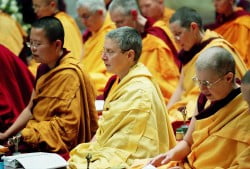Advice to a Monk
By Lama Zopa Rinpoche
This is advice given to a monk who is very dedicated to serving others and works very hard for others. He has been a monk for some years, but recently his mind became discouraged and he was thinking of giving up life as a monk to live a lay life.
When we met in London, he explained that he thinks it is simpler and easier to live a lay life. However, I know he is a very nice person and very dedicated to serving others and I thought it would be a big pity for him to give up. I thought if I gave him some advice, he wouldn’t give up. So I told him that his main problem is that he is not thinking correctly.
He said lay life is fully alive and is very easygoing, whereas the monk’s life is not easy, and one creates heavy negative karma. I said to him the main mistake is that you don’t think of death. If you knew you were going to die tonight, there would be nothing else to do but practice Dharma. The only thing useful would be to practice Dharma, to live in morality in the ordination. There is nothing better.
When you think that death is going to happen tomorrow or tonight, the conclusion comes to live in the vows, in the monk’s life. Therefore he is totally wrong, I told him, totally wrong. There is nothing else to do, nothing else useful but practice Dharma and live in ordination, live a monk’s life. It becomes essential – the best thing to do – when you think of death. I said therefore the way he thinks is crazy.
Also finding attachment to lay life is due to not analyzing lay life well. There are all the additional problems of a lay life. I said that living in the lay life, if your motivation is not in a state of compassion, bodhicitta; unattached to this life and to samsara; or realizing emptiness and having mindfulness of emptiness and the object of refutation; then the attitude is always delusion and all the actions that are done create negative karma. That’s how lay life is. You are totally hallucinating to think that lay life is freedom. You are totally wrong.
When you don’t think and analyze well you think lay life is free. It looks as if it is free from karma, but it is not. There is so little freedom in lay life to practice Dharma. There are so many obligations – family, friends, parents, and children – so many things. Life is filled with them and it makes one unbelievably busy. On top of that, this life is filled up with many distractions, inside and outside. Inside, the mind is filled with all the worldly things, following desire, clinging to all the worldly things. Life is filled with distraction.

Therefore, the monk’s life has much more freedom. There is always merit. Even if you don’t do any other special practices, you are still always collecting merit because you are living in the vows. The number of vows of a fully ordained monk is 253, and as many vows as you have, you collect that much merit. So merit is collected all the time just because one is living in the vows!
He said that he hadn’t broken the major vows. I said since you haven’t broken them, you are totally silly to be attracted to lay life. You are not analyzing lay life. You are totally stupid!
As it is mentioned in the ordination text, if one leaves the household life—this life’s suffering and future lives’ suffering—and lives in the ordination of renunciation, then there is so much freedom and happiness in this life and also in future lives. Living the life of ordination and renunciation has so much freedom and happiness and future lives have greater peace and happiness. So we are going from happiness to happiness to enlightenment. This gives the greatest opportunity.
Also I suggested—I don’t remember exactly, but the essence is—to think about liberating oneself from samsara. That means to cease the cause of delusion and karma. Otherwise, one will have to experience the suffering of samsara without end. One has to think of these important points. One has to think of the bigger vision. The biggest problem is being in samsara and the biggest vision to achieve is enlightenment to free all sentient beings from suffering and bring them to enlightenment. Therefore for that one needs to practice Dharma. These are the reasons you should continue to be a monk. Because of some difficulty in his life, he thinks that the lay life is much easier and there is more freedom. This is simply a hallucination coming from his own delusions. This is not Dharma wisdom. It is not how wisdom thinks. It’s how delusion thinks.
The essence is that there wouldn’t be any Buddhas, Bodhisattvas, or Arhants if everybody thought the same way as you do. If everyone thought that, they would give up practicing Dharma or give up the monk’s life when they find some difficulty. With delusion, with your self-cherishing thought or attachment, you will always find difficulty. Your self-cherishing thought finds some difficulty or your attachment finds some difficulty. But if everyone did what you want to do, then there would be no Buddhas, Bodhisattvas, or Arhants now.
Why are there so many Buddhas, Bodhisattvas, and Arhants? It is because, even though they had all the same delusions and sufferings as you, they put effort into actualizing the path and ceasing all the defilements. The Buddhas, Bodhisattvas, and Arhants all actualized bodhicitta by letting go of the ‘I’, letting go of attachment to samsara’s happiness. That is why there are numberless Buddhas, Bodhisattvas, and Arhants. Before, they were ordinary beings, but they made an effort and became Buddhas, Bodhisattvas, and Arhants. You also can do this.
When these kinds of thoughts come it is extremely important to analyze. Analyze the benefits and shortcomings; determine which way has benefit, and which way has no benefit but only shortcomings; and choose the one with benefit. Among those that have smaller or greater benefit, choose the greatest benefit, choose the one that causes happiness in future lives and causes liberation from samsara and full enlightenment. Choose those things rather than what causes more suffering in samsara and is the cause of the lower realms.
This is what to do when the thoughts come that you want to give up the life of ordination, Dharma practice, and so forth. When one has that mind – which is deluded – make a decision without yourself becoming a friend of delusion. Rather be in the middle without being a friend of delusion, and then you are able to see clearly the benefits and the shortcomings. This way, you proceed towards Dharma rather than following delusion. Otherwise your thoughts can deceive and cheat you. They cheat you out of not only this life’s happiness but also out of future lives’ happiness. You lose all your happiness, your future lives’ good rebirths, your liberation from samsara, and enlightenment.
This is the advice to a monk, for his mind not to carry on the hallucinations. As I mentioned these things to him, he was crying.
Colophon
Reprinted with permission from Lama Yeshe Wisdom Archive. For further information, please visit www.LamaYeshe.com



